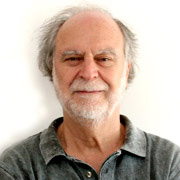Massimo Canevacci
 |
Massimo Canevacci is a professor of cultural anthropology, and of art and digital cultures at the Università degli Studi di Roma La Sapienza, Italy. Currently as a visiting professor at the IEA, Canevacci develops studies in the intersection of four major conceptual frameworks: self-representation, linked to decentered ethnographic methods; ubiquity, grounded on the idea of a flexible polycentrism replacing the notion of a single, politically-defined historic center; visual fetishism, related to disruption of classical dualism; and critical and experimental theory based on current new readings of the work of Theodor Adorno. His research focuses on the areas of ethnography, visual communication, art, and digital culture. He has previously been in Brazil as a visiting professor at the State University of Rio de Janeiro (Uerj) and at the Federal University of Santa Catarina (UFSC). His most recent book is 'SincrétiKa: Explorações Etnográficas sobre Arte Contemporânea' [SincrétiKa: Ethnographic Explorations on Contemporary Artes] (2014). |
|---|
Activity at ICA: Conference
The ethnographic experiences of digital cultures and the syncretic mix of spacetimes
My paper will present an anthropological perspective on time through the key-concept of ubiquity: ubiquitimes. Digital cultures and communication are going to transform the classical distinction of space-and-time, favouring a decentred and non-linear experiences of spacetimes. A strong metaphorical use of this term has been used recently on web-culture. A shared affirmation is that the web is ubiquitous and so ubiquities characterizes internet´s space-time (human and not-human) relations. Ubiquitimes also expands a restless montage of syncretic concepts and polyphonic methods in digital culture. I’ll discuss the differences between the traditional avant-garde concepts of simultaneity and of the theological one of ubiquity. Than I’ll present the digital emergence and the contemporary different meanings of ubiquity as immanent inter-connections and inter-sections on times-and-spaces. Ubiquitimes play a logical-sensorial immanence of material/immaterial character; express tensions beyond hegemonic dualism or regressive dichotomous ratio. Ubiquitimes is the exact imagination potentiality connected to digital every-day life. I’ll select some empirical cases in order to demonstrate my hypotheses on auto-generative experiences of ubiquitous times (ubiquitimes) in different cultures and persons: a mythical Greek divinity (Kairos), a Swatch advertising, a Bororo funeral ritual, a post-Euclidean architect (Zaha Hadid), and finally the subjective experiences with digital technologies (multividual).
